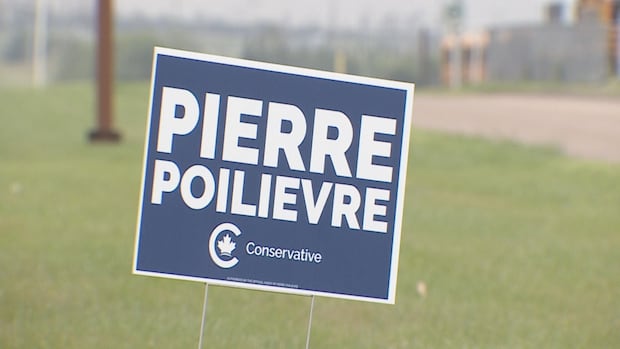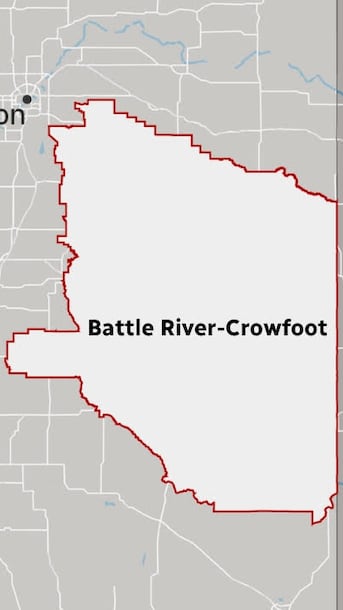[
The upcoming federal byelection in Battle River-Crowfoot has Jennifer Fossen in unknown territory.
Fossen is the president of the Camrose & District Chamber of Commerce. In the April federal election, it held a candidate forum. Only one nominee showed up to speak to a half empty room.
Three months later, Fossen is hosting another candidate forum, this time in a byelection race featuring Conservative Leader Pierre Poilievre, and the response is, well, off the hook.
Fossen said phones at her office have been ringing constantly with people inquiring about the July 29 candidate debate. But all seats are booked and 10 candidates have signed up to speak.
“[It] has definitely taken everything to the next level,” Fossen said this week in an interview.
“It’s fantastic to see the voter engagement and just the interest in the democratic process.”
Poilievre is a vying to win the Aug. 18 vote in Battle River-Crowfoot, a sprawling rural riding that takes up the entire eastern side of Alberta from Edmonton to Calgary.
The writ was dropped last month after Conservative Damien Kurek, who overwhelmingly won the seat in the April general election, stepped down to allow Poilievre to run.
Poilievre lost his long-held Ottawa seat of Carleton in the April vote.
Canada’s next byelection is slated for Aug. 18 in the Alberta riding of Battle River-Crowfoot. Conservative Party Leader Pierre Poilievre is running in a bid to return to the House of Commons but now finds himself in an increasingly crowded race.
Poilievre’s signs can be seen scattered on lawns and the farm gates along a highway leading into the city of Camrose, the riding’s largest city.
His party said he has opened his campaign office in Camrose and he has attended town halls, rodeos, parades and a car show in the riding in recent weeks.
He said in a statement he’s coming home ready to take the voices of the riding to Ottawa.
“I am a born and bred Albertan, with strong Alberta values,” he said.
“As leader, I can take the fight for farmers, oil and gas workers, firearms owners, soldiers, for Albertans to the national stage. That means strong, forceful, representation for the people of Battle River-Crowfoot.”
The riding is rock-solid Conservative territory. Kurek won in April with about 83 per cent of the vote.
But Poilievre is facing challengers who question not only him, but the idea of parachuting a candidate in from afar.
Alongside the Poilievre signs are some for Independent Bonnie Critchley, a 44-year-old military veteran who spent time in Afghanistan.
Critchley said she stepped out of retirement and threw her cowboy hat in the race because she cares about the issues concerning the people in the riding. She criticized Poilievre for running just to advance his political career.
“I didn’t think it was right that the guy we overwhelmingly voted for is now gone,” said Critchley, who lives in Tofield, a town in the riding’s north end.
“I am running to be the voice for Battle River-Crowfoot in Ottawa. What this means is it will be my voice, but my neighbours’ words. I want to take us back to a proper, true, representative democracy.”
She told the constituents who met her at their doors that it was important to “vote for a representative, not a party.”
Critchley said she is registered to attend the forum and Poilievre will be there too.
Other candidates running in the byelection say criticism that Poilievre is a “parachute candidate” has dominated the conversations they’ve been having while door-knocking. Poilievre was born in Calgary and has lived in Ottawa for the past two decades.
“It comes up almost every single time that people are kind of angry that the previous representative got switched on them,” said Liberal candidate Darcy Spady, who is from Three Hills.
“They’re not happy with a drop-in from out of town with a background that’s more national in focus.”
Kurek’s exit also encouraged Independent Sarah Spanier to run.
“I share that frustration,” said Spanier.
“We overwhelmingly voted to support Damien, only to have that choice ripped away on a whim because Pierre got fired and feels the need to use us as some type of political pawn because he assumes this going to be a guaranteed win.
“I find that insulting.”
The byelection has become contentious in other ways in recent days.
Spanier said she has stopped door-knocking due to death threats, and RCMP have put out notices reminding people to be kind and respect the democratic process.
The byelection has also been in the spotlight due to the Longest Ballot Committee, which as of Thursday, had registered more than 190 candidates under its banner to bring attention to the issue of electoral reform.
Critchley, Spady and Spanier said they prefer staying focused on the issues in the riding.
Critchley said she wants to make life more affordable for constituents by, for example, advocating for the federal government to invest in seed research for the farmers affected by drought.
Spanier said she wants address food insecurity in the House of Commons.
Libertarian Party of Canada candidate Michael Harris said he wants Poilievre to lose so a referendum on whether Alberta should separate from the rest of Canada can make headway if he wins.
University of Calgary political scientist Lisa Young says although riding has historically voted conservative in provincial and federal elections, the byelection has become interesting because vocal Independent candidates have tapped into sentiment that only a leader who is rooted in the life of that riding and concerns should be elected.
“It’s going to be tricky for a lot of people in the riding because they are loyal conservatives,” she said.
“You’ve got a leader who lost his seat and now is looking for another seat but his future as party leader isn’t assured. He faces a leadership review in January,” she added.
“This sets this kind of a contest between that notion of what a member of Parliament should be and should do versus the party loyalty.”

